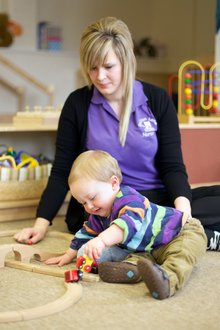As adults, we all manage change differently, and the same applies to our children. Some may adapt to change quickly, while others need more time to come to terms with changes. This coping ability will also depend on how significant the change is. For example, small changes to their daily routine, like needing to alter plans due to the weather or trying a new park instead of the usual one, may be easier to manage and cope with. In contrast, bigger changes, such as the arrival of a new sibling, moving house, or starting an early years setting, may feel much more daunting for many children.
It is important to acknowledge that while change is inevitable, it can be an upsetting time for children. They will experience a wide range of emotions, some of which may be new to them or frightening. This can be even more challenging if children don't yet have the understanding or language they need to communicate these emotions and express how they are feeling. There are some things you can do to support your child in managing change.
Talk about feelings and emotion
Talking and labeling feelings and emotions can help children develop the language skills they need to eventually communicate their feelings verbally. Look at books together and discuss how characters may be feeling; this will help develop their understanding.
Show empathy for your child's difficult emotions and acknowledge that it's okay to feel scared, worried, sad, etc., just as it's okay to feel happy or excited. Model language such as "I can see you are feeling cross..." or "You look sad, are you worried?"
You may find our Family Corner article Let’s talk about feelings helpful.
Keep routines the same
Having routines helps children feel safe and secure. This doesn't mean that every moment of your day needs to be scheduled, but consider some parts of the day where routines can remain the same, such as bedtime. Keeping the bedtime routine consistent every evening will help children understand that, regardless of what else might be happening in their lives, this part of their day will always feel familiar.
Look after your own wellbeing and consider how you are managing changes
Changes can be a challenging time for all. Maybe you are feeling upset or worried about your child starting school, for example, or maybe you are going through a separation with a partner. Looking after your well-being will enable you to be in the best position to support your child. Taking time for yourself and doing things that help you relax and stay calm is important.
Talk to your child’s key person
Whether your child is just starting an early years setting or has been attending for a while, the relationship between you, your child, and the key person will be vital. During the transition to a new setting, they provide consistency to your child, helping them feel safe and cared for in their new environment. If your child has been attending a setting for a while, this security will support them with other changes they may be experiencing. Share with your key person what is happening at home so you can work together to best support your child through consistency.
Talk to your child
Talk to your child about change and explain in simple terms that meet their level of understanding. Explain what is going to happen, perhaps using books or creating your own stories to help children understand what is going on. Visual timetables can also be useful.
Some children with special educational needs can find change particularly difficult. Even small changes can leave them feeling upset or worried. Again, a visual timetable showing the day's activities may help them prepare for what is going to happen. If they are starting a new school, share photographs and pictures of the building or key members of staff.
Useful links:
Parental mental health and parent wellbeing - BBC Tiny Happy People
National Autistic Society (autism.org.uk)
Helping children deal with change - CBeebies - BBC
Starting school and preschool | Family Corner







